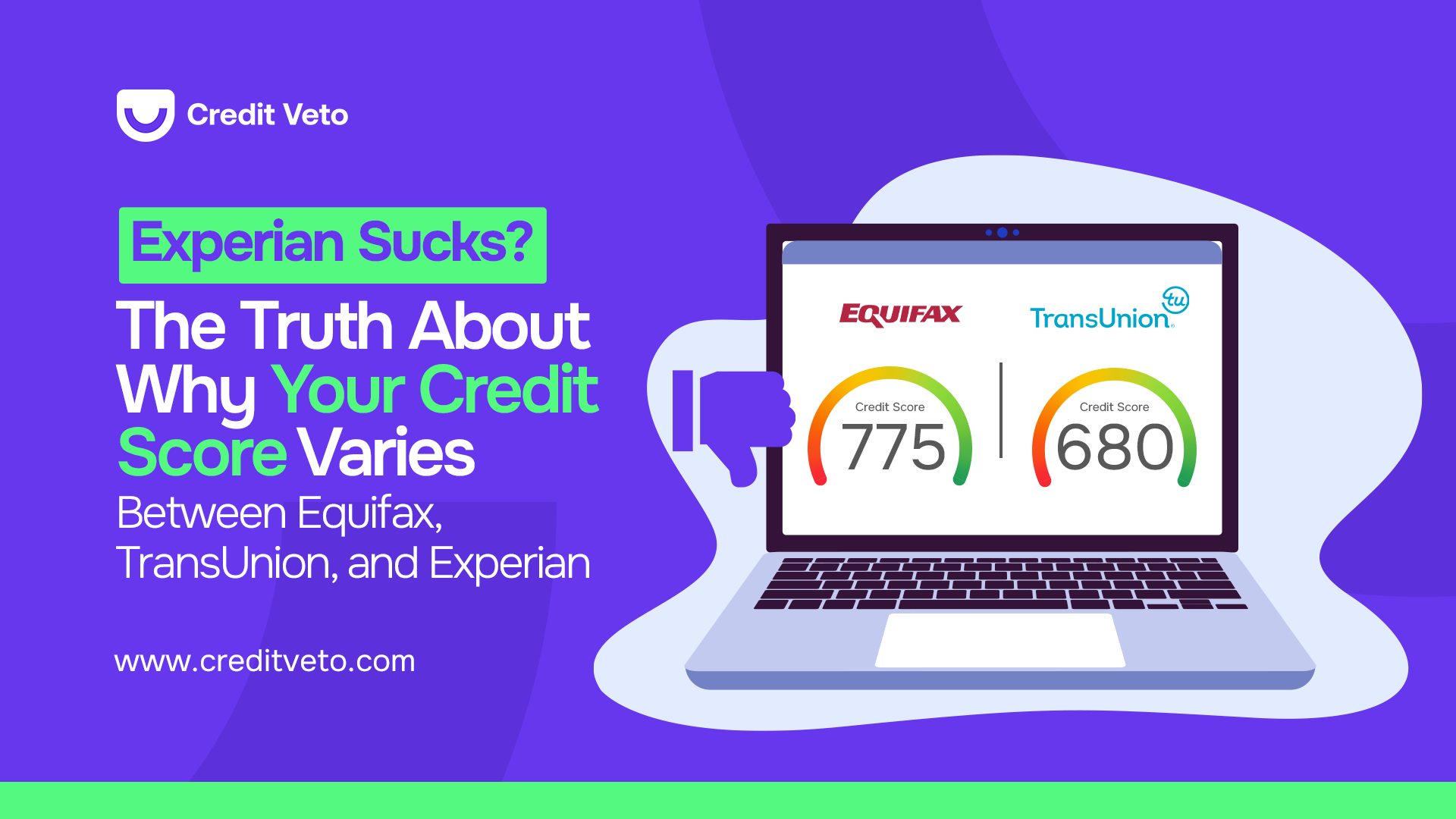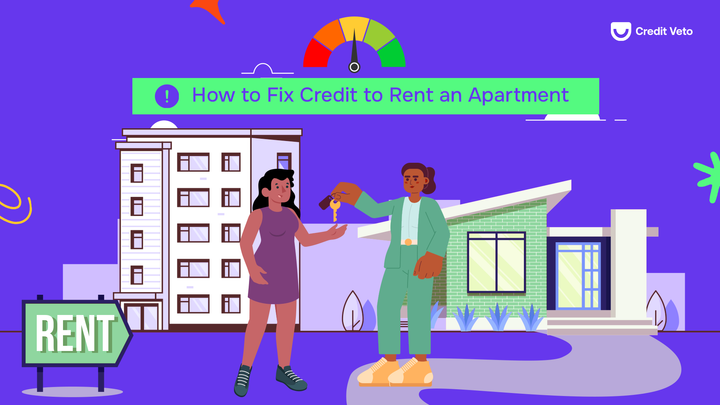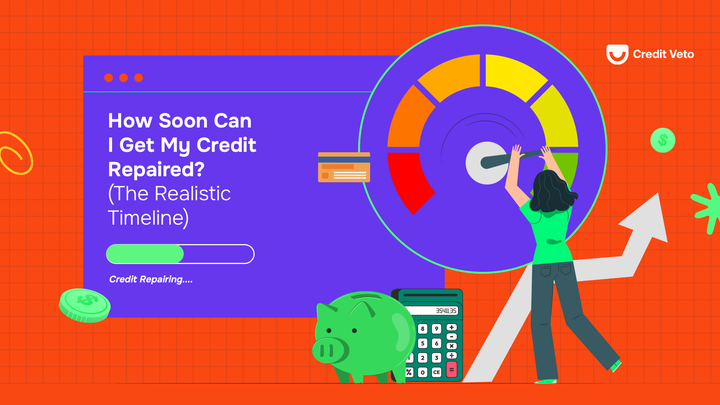Experian Sucks? Why Your Credit Score Varies Between Equifax, TransUnion, and Experian
Is your TransUnion score lower than Equifax? Learn why your credit scores differ and how to fix them quickly with Credit Veto. Dispute errors, optimize your credit, and see real results.

If you’ve ever checked your credit score, you’ve probably noticed that there’s a significant difference between your scores on Experian, TransUnion, and Equifax. You might be left wondering: Why is my TransUnion score always lower? Why are my credit scores all over the place, and why did my credit drop 100 points overnight?
These are common questions that often leave consumers frustrated, but the truth is, there are reasons why your credit score can vary between these credit bureaus. Understanding why this happens is key to taking control of your credit health.
In this post, we’ll dive into the differences between these credit bureaus, why your TransUnion score may be lower than Equifax or Experian, and what you can do to ensure your credit is on track across all three bureaus.
Why Is Your Credit Score Lower on TransUnion or Experian?
The first thing to understand is that your credit score isn’t calculated by a single entity. There are three main credit bureaus that lenders rely on to track your credit history: Experian, TransUnion, and Equifax. Each of these bureaus uses its own algorithms to generate your credit score, meaning that they may calculate it differently based on the data they have available.
It’s possible for your credit score to be higher with one bureau and lower with another. You might be asking yourself: “Why is my TransUnion score lower than Equifax?” Well, here’s why:
Data Variations Across Bureaus
Each credit bureau collects data from different sources. Some creditors only report to one or two bureaus, and others report to all three. For example, if your lender only reports to Equifax, your Equifax score will be more up-to-date than your TransUnion or Experian score.
Meanwhile, if a payment on your credit card isn’t reported to TransUnion, it won’t impact your TransUnion score. The discrepancies in the data can explain why your scores aren’t identical.
Credit Utilization
If you’re using more of your credit limit with certain credit cards than others, it may affect your score differently depending on which bureau is using that data. If one bureau uses your higher credit utilization data, your score with that bureau could be lower.
Late Payments
If you’ve missed a payment, that can stay on your report for years, and it may affect your score with one bureau more than another. Even if you make up for the late payment, some bureaus might view it as a more serious issue than others.
Why Did My Credit Drop 100 Points?
One of the most frustrating experiences is when your credit score drops dramatically without warning. You might log into your credit monitoring service and see that your credit has dropped 100 points, or even more. What causes this?
Here are some possible reasons why your credit score may take a sudden dive:
Credit Report Errors
One of the most common reasons your score drops is due to inaccurate or outdated information on your credit report. Mistakes happen, and sometimes errors like incorrect late payments or wrong information on your credit utilization can result in a lower score.
For example, if your credit card issuer reports a late payment by mistake, it can cause a major dip in your score. The good news is that you can dispute these errors, and platforms like Credit Veto can help you track and resolve such issues.
Credit Card Utilization
Your credit card utilization ratio, which is the percentage of your available credit that you’re using, has a significant impact on your credit score. If you’ve recently maxed out a credit card or added a large purchase, your credit utilization ratio could have spiked.
This can lead to a dramatic drop in your score. Ideally, you want to keep your credit utilization below 30% of your credit limit. If you go above this, it could negatively affect your score, especially with TransUnion or Experian.
Account Closures or New Accounts
Closing old accounts or opening too many new accounts can cause your score to drop. Each credit inquiry is a “hard pull,” which temporarily lowers your score. If you have too many hard pulls within a short period, it could indicate to lenders that you’re trying to get more credit than you can handle, leading to a drop in your score.
Why Is TransUnion Always Lower?
It’s a question many consumers ask: Why is TransUnion always lower? As mentioned earlier, each of the credit bureaus operates independently, and they each may report different data. Here’s why TransUnion might be lower for you:
Reporting Discrepancies
TransUnion may have outdated or incomplete information that other bureaus don’t. Since not all lenders report to all three bureaus, it’s possible that the information TransUnion has isn’t as comprehensive or up-to-date as Equifax or Experian.
Debt and Collections
If you have any outstanding debt or collections that have been reported to TransUnion but not to the others, this could lower your TransUnion score. This is especially common with medical bills or old rent collections that might only appear on one bureau’s report.
Credit Utilization and Payment History
If your credit utilization or payment history is reported more negatively to TransUnion, it will impact your score. Even if the other bureaus show a better picture, TransUnion may calculate your score with a higher impact from negative factors.
What’s More Important, Equifax or TransUnion?
A common question people have is whether Equifax or TransUnion is more important when it comes to getting approved for credit or loans. The truth is, both are important. Lenders will often check your score across all three bureaus, and your score can vary. However, some lenders may have a preference for one bureau over another based on the information they use most frequently.
In general, Equifax tends to be the most commonly used when it comes to mortgages and auto loans, while TransUnion is frequently used for credit card applications and personal loans. Experian, on the other hand, is often used for other purposes, like checking your credit for insurance rates.
So, while Equifax and TransUnion are both vital, it’s best to track your score with all three bureaus to ensure you’re on top of your credit health.
The Importance of Credit Score Optimization
Your credit score is more than just a number; it’s a reflection of your financial health and plays a crucial role in determining your eligibility for loans, credit cards, and even certain jobs or housing opportunities. Whether you’re dealing with a 675 credit score or already have a 680 credit score, understanding how to optimize it can make all the difference in your financial journey.
Credit score optimization is the process of actively managing and improving your credit score by addressing various factors that impact it. These factors include credit utilization, payment history, credit inquiries, and even the length of your credit history. Each of these components plays a role in how your score is calculated and how lenders view you as a borrower.
Why Optimizing Your Credit Score Matters
Here are four reasons why optimizing your credit score is non-negotiable.
1. Better Loan Approval Chances
The higher your credit score, the better your chances of being approved for loans, whether it’s for a car loan, mortgage, or personal loan. Lenders are more likely to approve borrowers with higher credit scores because they are seen as less risky.
With a 680 credit score, you’re already in a solid position, but optimizing further can push you into an even better range, making the process smoother and less stressful.
2. Lower Interest Rates
Another major benefit of credit score optimization is the potential to secure lower interest rates on loans and credit cards. A higher credit score signals to lenders that you’re a reliable borrower, which means they may offer you lower rates, saving you money in the long run.
A 675 credit score might lead to higher rates, but optimizing it to 700 or above could make a significant financial difference.
3. Better Terms on Credit Cards
Many credit card companies offer better rewards, higher credit limits, and lower interest rates to individuals with higher credit scores. If you’re working with a 680 credit score or slightly lower, you may not have access to the best credit card deals.
However, with some credit optimization, you can move into a range where you qualify for cards that offer valuable perks, such as travel rewards, cashback, and 0% APR introductory periods.
4. Increased Financial Flexibility
A well-optimized credit score gives you more flexibility in your financial life. Whether you need a personal loan for an emergency, a new car, or even financing for a home renovation, a higher score will provide you with better options and potentially faster approvals.
Additionally, it can be a game-changer for situations like renting a home or applying for a job that requires a credit check.
Steps to Optimize Your Credit Score
Follow these five steps to optimize your credit score better.
1. Pay Your Bills on Time
Your payment history is one of the largest factors affecting your credit score. Even a single late payment can have a long-lasting impact. Make sure to set up reminders or automate payments to avoid late fees and negative marks on your credit report.
2. Reduce Your Credit Utilization
Credit utilization, or the percentage of your available credit that you’re using, has a big impact on your score. Aim to keep your credit utilization ratio under 30%—this can be one of the quickest ways to improve your score. If you’re already close to this threshold, paying down debt and avoiding additional charges will make a noticeable difference.
3. Check for Errors
Mistakes happen, and sometimes credit reports contain errors that can negatively affect your score. Always check your credit report for any inaccuracies, such as incorrect late payments or accounts that don’t belong to you. Disputing errors can quickly improve your credit score.
4. Avoid Unnecessary
Hard Inquiries Each time you apply for credit, it results in a hard inquiry, which can lower your score temporarily. Limit the number of hard inquiries on your report by only applying for credit when necessary. If you need to check your score, request a soft inquiry, which won’t impact your score.
5. Keep Old Accounts Open
The length of your credit history accounts for a portion of your score. Closing old accounts can shorten your credit history and potentially lower your score. Keep your older accounts open, especially if they don’t have an annual fee or high interest rates.
How to Fix Your Credit with Credit Veto
If you’ve noticed a difference in your credit score across the bureaus, don’t worry—you can still improve your credit with the right steps. Here’s how Credit Veto can help:
1. Dispute Errors
If your credit report has errors, Credit Veto makes it easy to dispute them. Credit Veto helps you identify discrepancies and works with you to fix them, ensuring your credit score reflects accurate information across all bureaus.
2. Track Progress
By regularly tracking your credit score, you can monitor your progress and see which areas need improvement. Credit Veto allows you to see real-time updates on your score so you can stay on top of changes.
3. Strategic Credit Repair
Credit Veto offers personalized tips on how to improve your credit score based on your unique situation. Whether it’s paying down debt, keeping credit utilization low, or disputing inaccuracies, Credit Veto gives you the tools and guidance you need to repair your credit quickly and effectively.
Conclusion
Understanding credit scores can be confusing, especially when they vary so widely between the bureaus. If you’ve ever wondered why my TransUnion score is lower than Equifax or why your score dropped, now you know it’s due to discrepancies in the data each bureau collects. The key takeaway is to monitor all three credit scores and use tools like Credit Veto to keep them in check.
If your score isn’t where you want it to be, start working on it today. With the right steps, you can fix errors, improve your score, and finally get the credit you deserve.
Frequently Asked Questions (FAQ)
Q1: Why is my TransUnion score lower than my Equifax score?
A1: Your scores may vary due to differences in the data each bureau has, including reporting from creditors, payment history, and credit utilization.
Q2: How long does it take to improve my credit score?
A2: It can take anywhere from 30 to 90 days to see significant improvements, especially if you’re disputing errors and paying down debts.
Q3: How can Credit Veto help with my credit score?
A3: Credit Veto helps by providing tools to dispute errors, monitor your score, and get personalized credit repair tips, making it easier to improve your score across all bureaus.




Comments ()